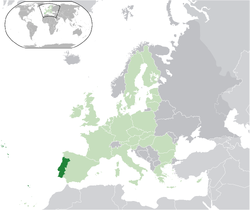|
República Portuguesa | |

|

|
| Anthem A Portuguesa | |
| Capital | Lisbon |
| Government | Republic and parliamentary democracy |
| President | |
| - From 2011 | Aníbal Cavaco Silva |
| Prime Minister | |
| - From 2011 | José Sócrates |
| Legislature | Assembly of the Republic |
| History | |
| - October 5, 1910 | Monarchy abolished |
| - April 25, 1974 | Carnation Revolution |
| EU accession | January 1, 1986 |
| NATO accession | April 4, 1949 |
| Area | 92,090 km² |
| Population | |
| - February 2011 | 10,647,267 |
| Density | 115.6/km² |
| GDP | February 2011 (PPP) |
| - Total | US$ 234.5 billion |
| - Per capita | US$ 22,027 |
| Currency | Euro |
| NUTS Region | PT1 |
| v | |
The Portuguese Republic is a parliamentary democracy in Europe.
Background
Following its heyday as a global maritime power during the 15th and 16th centuries, Portugal lost much of its wealth and status with the destruction of Lisbon in a 1755 earthquake, occupation during the Napoleonic Wars, and the independence of its wealthiest colony of Brazil in 1822. A 1910 revolution deposed the monarchy; for most of the next six decades, repressive governments ran the country. In 1974, a left-wing military coup installed broad democratic reforms. The following year, Portugal granted independence to all of its African colonies. Portugal is a founding member of NATO and entered the EC (now the EU) in 1986. In January 2011, Portugal assumed a nonpermanent seat on the UN Security Council for the 2011-12 term.[1]
Economy
Portugal has become a diversified and increasingly service-based economy since joining the European Community in 1986. Over the past two decades, successive governments have privatized many state-controlled firms and liberalized key areas of the economy, including the financial and telecommunications sectors. The country qualified for the European Monetary Union (EMU) in 1998 and began circulating the euro on 1 January 2002 along with 11 other EU member economies. Economic growth had been above the EU average for much of the 1990s, but fell back in 2001-08, shrank 2.6% in 2009, before growing 1% in 2010. GDP per capita stands at roughly two-thirds of the EU-27 average. A poor educational system and a rigid labor market have been obstacles to greater productivity and growth. Portugal also has been increasingly overshadowed by lower-cost producers in Central Europe and Asia as a target for foreign direct investment. Portugal's competitiveness problems, low growth prospects, and high levels of public debt have made it vulnerable to bond market turbulence. Lisbon is implementing austerity measures to reduce the budget deficit from 9.4% of GDP in 2009 to 4.6% of GDP in 2011, but some investors have expressed concern about Portugal's ability to achieve these targets and cover its sovereign debt. Without the option for stimulus measures, the government is focusing instead on boosting exports and implementing labor market reforms to try to raise GDP growth and tackle Portugal's competitiveness problems, which may help mitigate investor concerns over time.[2]
President
- Aníbal Cavaco Silva (₩) (2011 - )
Prime Minister
- José Sócrates (₩) (2011 - )
Nation
Portuguese Polities
Kingdom of Portugal (1139-1910)
Portuguese Republic (1910-1926)
Portuguese Republic (1926-1974)
The Azores (From 1976)
Madeira (From 1976)
Neighbouring Nations
References
- Portugal: Guide to Law Online (Library of Congress)
- The World Factbook (CIA)
- Chiefs of State and Cabinet Members of Foreign Governments (CIA)
- U.S. Department of State
- Australian Government
- European Union
- Inter-Parliamentary Union - Assembly of the Republic
- BBC News Country Profile
- BBC News Time Line
- World Statesmen.org
- International Constitutional Law Project
- Psephos Election Archive
- Wikipedia
